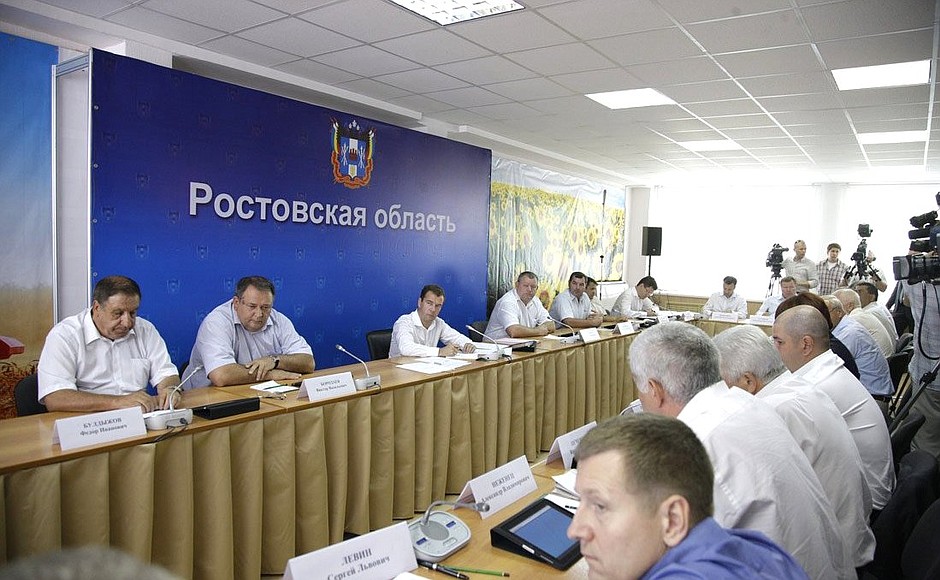President of Russia Dmitry Medvedev: Good afternoon, everyone.
We are facing a major challenge in agriculture: the effects of drought and related support to producers. We must think about ways to stabilise the market.
The situation is severe, and in some regions it is an emergency. The Rostov Region is less affected by the crisis, although there are some problems here too, which is why I asked to invite top managers of agribusinesses to this meeting so they can tell me about their problems themselves.
Let us organise our work as follows: first, I will say a few words, and then we will hear those who wish to speak; after that Agriculture Minister [Yelena Skrynnik] will comment on some of the issues discussed, and I will summarise the main points.
The situation, I repeat, is very difficult: about a quarter of grain crops have dried up across the country and because of crop failure many farms are unfortunately facing bankruptcy. So, why is it that we should discuss this issue and why here?
A few days ago I visited Mari El, one of our republics that has suffered great damage, both from wildfires and from drought. No surprise, they have a very big problem with fodder, among other things. The situation here is better, and we should set up an exchange system to provide some help and take the right steps at the Government level.
The Government apprehends the overall situation, is aware of what is happening and, hopefully, has it under control. Decisions on financial assistance to farmers in a critical situation have already been adopted. The total amount of [federal] financial support has reached about 35 billion rubles [over $1.1 billion].
In addition to this amount, the regions will also provide assistance to the affected farmers. And I will repeat this because it is very important: cooperation between regions in such a situation is absolutely vital. Of course, it is necessary to properly monitor the use of the allocated funds as it is a lot of money.
There are several urgent tasks, and I hope that final decisions on them will be reached in the course of our discussion today. One of these decisions relates to the possibility of [grain market] interventions. Our intervention fund has quite essential reserves of about 10 million tons [of grain] and will perform the function of an “airbag”.
We should think first about those regions where the situation is extremely difficult. Currently, the Government is drafting a resolution on the sale of fodder from the intervention fund for supplying agricultural products, raw materials and foodstuffs. We need to discuss where these interventions will take place, and there is a number of regions where grain intervention is a matter of urgency: these are 27 regions, and you know which ones, that have been more severely affected than the others.
Today I spoke about this with the Agriculture Minister and with top Government officials. I think that ultimately the resolution that will be adopted on the intervention sale of fodder, specifically, of fifth grade wheat and feed barley, will contain a clause that such intervention can also occur in other regions if required, including those that have been less affected but where there is a great need for animal feed and where we feel that we have to inject something. I propose that we discuss this subject today, as I instructed the Government to draft the resolution as soon as possible.
Another topic on which I would like to exchange opinions is a system of agricultural risk insurance. We all know that it doesn’t function in our rural areas and despite government subsidies, only one fifth of the harvest is insured.
We tend to use our brains after the events have happened, what is called in hindsight. But after the year we’ve been having, it has become abundantly clear that the insurance system in the agricultural sector must be revised, it must become more viable and more functional. Incidentally, we talked about this last year, when the crop was affected by what seemed like adverse conditions back then.
But this has become absolutely crucial after the hard lessons of abnormally high temperatures and drought we had this summer. Therefore, we must modify the existing system of risk insurance to make it more efficient and cost effective.
There is another issue that has been decided. The Government will introduce temporary restrictions on grain exports. This, of course, was a very difficult decision, given the obligations of our state and our companies, but this is a real force majeure, an unforeseeable circumstance.
The aim of this decision is to preserve stocks and to balance the interests of grain producers, food processors and livestock breeders. Behind this lies another goal, which is equally important.
We must not allow any growth of grain prices and of commercial mixed feeds. We need to realise what in this case will happen eventually to prices of staple foods: flour, bread, meat and milk. Everyone is thinking about this now, the farmers and the officials who are responsible for this sector, and we know that it also weighs heavy on the minds of ordinary people. What is going to happen after this dire summer, how will it affect the prices of the most basic staples? This is the direct responsibility of the Government and the regions.
I think that we should monitor this situation practically on a daily basis, because in these circumstances, naturally, we can expect that there will be those who will want to take advantage of the situation; in fact, they already have. In this case I am not referring to the farmers or producers, but to other links of the agriculture chain, the people involved in distribution.
We can see the symptoms already, despite the support measures. Even though the situation is difficult, it is not critical and this year, we are sure to pull through, but we have to think about the way the market will develop next year. Nevertheless, there are those who try to line their pockets.
Therefore, I hereby instruct the Government, the oversight agencies and the prosecutors to monitor the pricing policies in the market. We must realise that this is the most sensitive food category and our people’s standard of living and the agricultural sector as a whole depend on it.
There is also the issue of loans. At a recent meeting in Belgorod, we discussed the extension of subsidised loans, the situation in the credit market and the reduction of lending rates. I would like to hear from the managers of agribusinesses present here about the state of affairs and the effective rate at which bank loans are available today, because I believe we have an awareness gap here.
In my travels around the country, in small towns and villages, I hear about the interest rates available there. I visited Mari El recently, and heard about appalling interest rates there, though these were not agricultural loans, but the situation is clear anyway because interest rates on different kinds of loans are interdependent. I contacted the main banks after that and they said: “No, we don’t have 17–18% interest rates on any short or long-term loans now. We would be happy if the interest rates were so high, but in fact they are lower.” I said: “All right, then you should make this information public.”
I would rather you told me yourselves about the interest rates available currently in the Rostov Region at Sberbank, the Russian Agricultural Bank and other banks, and about how these loans can be obtained.
We must think about the future, prepare methodically for the sowing of winter crops and spring crops, analyse the situation, and learn our lessons from the difficult weather anomalies that occurred this year.
I think that is enough for now. I ask everyone present, let us go on in an informal format: anyone who wants to speak, please identify yourself and talk to us. Go ahead, please.
<…>

